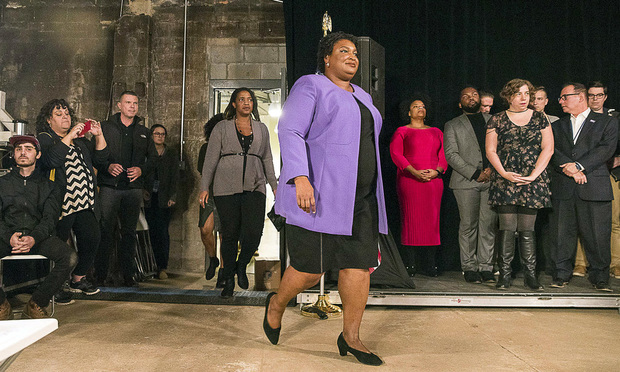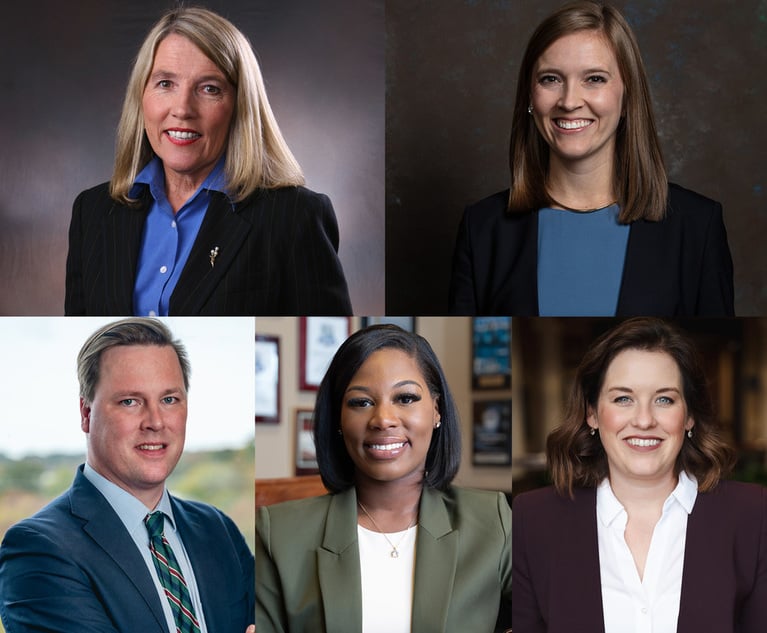With Elections Over, Voter Suppression Lawsuits to Push Forward
Democrat Stacey Abrams promised her organization will file a lawsuit as early as next week to reform what she called “gross mismanagement” of an election that left her about 17,000 votes shy of a mandated runoff. That would join seven other pending election lawsuits.
November 21, 2018 at 12:39 PM
11 minute read
 Stacey Abrams (Alyssa Pointer/Atlanta Journal-Constitution via AP)
Stacey Abrams (Alyssa Pointer/Atlanta Journal-Constitution via AP)
While Georgia's contentious gubernatorial election may be over, the string of litigation targeting the state's alleged voter suppression efforts will continue to linger for months as voting rights advocates attempt to repair by 2020 what they say is a deeply flawed election system.
When Democrat Stacey Abrams formally stepped aside for Republican Brian Kemp to become governor, she made clear that she believes her opponent used his office as secretary of state to systematically disenfranchise voters. Kemp held the post until two days after the election.
Abrams promised her organization, Fair Fight Georgia, will file a lawsuit as early as next week to reform what she called “gross mismanagement” of an election that left her about 17,000 votes shy of a mandated runoff.
Seven federal voter rights lawsuits already pending over the November midterms that could affect future elections, including the Dec. 4 runoff. Five federal judges in Georgia have already issued six temporary restraining orders or injunctions mandating that additional ballots—largely paper absentee and provisional ballots—be validated and counted rather than discarded.
The Daily Report could not reach Kemp counsel Ryan Teague, a partner at Atlanta's The Robbins Law Group, for comment. Kemp spokesman Cody Hall did not address questions about the ongoing and proposed litigation. Instead, Hall said, “The election is over. It's time to move on. … What Ms. Abrams decides to do is her business.”
But in an interview with The Atlanta Journal-Constitution, Kemp called the lawsuits “ridiculous.”
Here's a rundown of the pending suits, and what comes next:
Curling et al v. Kemp et al
This suit seeks a court-ordered return to paper ballots for all elections in Georgia. It sounded alarms from cyberexperts across the country that the state's outdated electronic voting system is not only hackable but has repeatedly been exposed since 2016 to online interlopers, including possibly Russian intelligence.
In September, Judge Amy Totenberg of the U.S. District Court for the Northern District of Georgia declined to order the switch to paper ballots, claiming the election was too close. But she said the current electronic system “poses a concrete risk of alteration of ballot counts” that could affect the vote.
Kemp and the state election board, represented by former Gov. Roy Barnes and partner John Salter of The Barnes Law Group, have appealed Totenberg's order, arguing the suit should be dismissed and that state officials have immunity. Totenberg agreed in October to stay discovery until the U.S. Court of Appeals for the Eleventh Circuit rules.
But the fight continues. Morrison & Foerster partner David Cross, who represents plaintiff voters in the case, said the Eleventh Circuit has expedited the appeal. “We expect it will sustain Judge Totenberg's ruling early next year,” he said. “Then, we'll conduct discovery and head quickly to trial.”
Atlanta attorney Bruce Brown represents the nonprofit Coalition for Good Governance, a co-plaintiff. On Nov. 20, Brown notified the defense that, before election officials across the state reprogram their voting machines for the runoff, they must preserve an electronic image of all data recorded on every individual voting machine, all servers and other electronic data or risk violating a court order.
Georgia Muslim Voter Project v. Kemp
A lawsuit that began as a fight to rehabilitate absentee ballots thrown out over perceived signature mismatches, is expected to continue as plaintiffs lawyers seek an injunction to permanently stop the practice.
The suit prompted Judge Leigh Martin May, also of the Northern District Court in Atlanta, to issue a temporary restraining order directing Kemp to instruct election officials to treat absentee ballots with alleged signature mismatches as “provisional” before rejecting them. County election officials also were instructed to notify voters and give them a chance to resolve the flagged discrepancy.
Sean Young, legal director of the ACLU of Georgia, which filed the suit, called it an example of voter suppression. “We are going to do everything we can to fight back,” he said.
Martin v. Kemp
Similar to the ACLU suit, this case seeks to permanently limit absentee ballot rejections over fixable errors, including a mismatched signature or a mistakenly omitted birth year.
Attorneys with the Lawyers Committee for Civil Rights Under Law are co-counsel with Brown.
May's restraining order, issued in October, applied to both the ACLU and Martin cases.
On Nov. 13, May issued a second TRO directing Gwinnett election officials to validate and count all absentee ballots rejected because of a birth year error.
Brown, who represents the plaintiff voters, said he wants to permanently bar election officials from rejecting an absentee ballot “on grounds that the state has already decided are immaterial to a voter's qualifications, including, but not limited to, the birth year mistakes.”
He added, “The state permanently needs to provide due process before it rejects any vote based upon a perceived signature mismatch.”
Common Cause Georgia v. Kemp
This suit seeks to validate provisional ballots that traditionally have been destined for the trash rather than counted, but it more broadly challenges the accuracy and reliability of the state's electronic voting system and whether it's disenfranchising voters.
The suit echoes claims in the Curling paper ballot litigation over security vulnerabilities of the state's voting system. It was triggered by a voter's discovery just days before the election that confidential voter registrations were publicly accessible through the secretary of state's website.
It, too, calls into question the accuracy of the state's electronic registration database and the legitimacy of ballot rejections based on a missing voter registration.
On Nov. 12, Totenberg issued a TRO delaying certification of the election and gave election officials until Nov. 16 to conduct a “good faith review” of all provisional ballots rejected because voters names were missing from the state database. She also directed those ballots to be counted if voters could prove they had registered.
Although she stayed the Curling case while it is on appeal, Totenberg appears determined to pursue election security issues and has asked counsel for an expedited discovery schedule. Drawing on affidavits from voters who were denied ballots at the polls on Nov. 6, Totenberg observed: “The real world experience reflected in citizens' credible statements regarding the deletion or corrosion of their registration data, when they have regularly voted for years at the same location or have other registration documentation or verification, must carry some weight.”
Myrna Perez, deputy director of the Brennan Center's Democracy Program at New York University's School of Law and one of the attorneys representing Common Cause, wouldn't comment on whether or how Common Cause will pursue the case. Common Cause Georgia Executive Director Sara Henderson could not be reached for comment. William Freeland, an attorney with Paul Weiss Rifkind Wharton & Garrison in New York who is leading a team of lawyers working with the Brennan Center, also couldn't be reached.
Palast v. Kemp
A lawsuit filed against Kemp by investigative journalist Greg Palast, author of “The Best Democracy Money Can Buy,” and Helen Butler, a Morgan County elections official and executive director of the Coalition for the People's Agenda, has broken loose information allegedly revealing Kemp's staff improperly purged more than 340,000 registered voters from Georgia voter rolls in 2016 and 2017 simply because they hadn't voted in two years—more than enough people to possibly swing the gubernatorial results.
Palast is seeking more information on whether Kemp coordinated with other Republican secretaries of state, most notably Kris Kobach of Kansas, in purging tens of thousands of people from voter rolls without due diligence and based on what he suggests were dubious methodologies.
Because there's been little or no discovery in the other cases, Palast's data looks at how state housekeeping efforts to ensure voter registration rolls remain accurate could morph into voter suppression. His case is assigned to Totenberg.
Palast has submitted an amicus brief in the Common Cause case, and said he is willing to make his data available to Abrams' legal team. Palast and a film crew have interviewed a number of purged voters, including a 92-year-old cousin of Martin Luther King Jr. who was refused a regular ballot because her registration was missing from the secretary of state's database, although she had voted in the same location for 50 years.
Georgia Coalition for the Peoples' Agenda Inc. et al. v. Kemp
This case challenges as unconstitutional the state's exact match voter registration law—which codified a longtime policy Kemp diligently applied. The law requires that voter registration information exactly match personal information contained in databases maintained by the Georgia Department of Driver Services and the U.S. Social Security Administration.
The suit claims that, under Kemp's “exact match” protocol, “the transposition of a single letter or number, deletion or addition of a hyphen or apostrophe, the accidental entry of an extra character or space, and the use of a familiar name like 'Tom' instead of 'Thomas' will cause a no match result.”
More than 53,000 voter registrations were placed in limbo before the Nov. 6 election due to “exact match,” including more than 3,000 newly-minted U.S. citizens who were flagged as “non-citizens.” Kemp claimed those in limbo could vote, if they presented proper identification and proof of citizenship at the polls.
On the final day of early voting, Judge Eleanor Ross, also of Georgia's Northern District court, granted an emergency injunction ordering Kemp to allow people flagged as noncitizens to vote, if they furnished proof of citizenship at the polls.
For everyone else, it remains unclear how poll workers responded and whether those voters were allowed to cast a regular ballot or given a provisional one and whether it was ultimately counted.
John Powers, an attorney with the Lawyers' Committee for Civil Rights Under Law, which is representing the plaintiff civil rights groups who sued, said, “We will continue to pursue the case. … Exact match is going to get an extended hearing.”
The plaintiff civil rights groups are represented by attorneys with Lawyers' Committee and the Campaign Legal Center in Washington, D.C., Atlanta attorney Bryan Sells and Gregory Farrell with Vilia Hayes of New York's Hughes Hubbard & Reed.
The case marks the second time Lawyers' Committee has sued Kemp over exact match. Committee attorneys filed the first challenge in early 2016. The case settled after Kemp promised a federal judge in September 2016 that he would suspend the program and restore voter registrations suspended because of it going back to 2014.
But Kemp resumed the practice after the Georgia General Assembly gave final approval in March 2017 to a bill codifying exact match. Powers said the new law subverted the settlement.
The Democratic Party/AFG Group v. Crittenden et al.
The future of this suit—filed as votes were still being counted and Abrams was pushing for a runoff—will likely be determined by the new litigation Abrams has promised, said Kurt Kastorf, an attorney with The Summerville Firm representing the Abrams campaign and the Democratic Party. Kastorf is co-counsel with Halsey Knapp and Adam Sparks of Atlanta's Krevolin & Horst.
But the campaign legal team successfully persuaded the Northern District's Judge Steve Jones to expand the pool of absentee ballots that needed to be counted rather than discarded because of a missing birth year.
Jones issued a limited TRO on Nov. 15 that expanded May's earlier TRO to apply statewide. May's order applied only to Gwinnett County.
This content has been archived. It is available through our partners, LexisNexis® and Bloomberg Law.
To view this content, please continue to their sites.
Not a Lexis Subscriber?
Subscribe Now
Not a Bloomberg Law Subscriber?
Subscribe Now
NOT FOR REPRINT
© 2025 ALM Global, LLC, All Rights Reserved. Request academic re-use from www.copyright.com. All other uses, submit a request to [email protected]. For more information visit Asset & Logo Licensing.
You Might Like
View All


Plaintiffs Attorneys Awarded $113K on $1 Judgment in Noise Ordinance Dispute
4 minute read
'Didn't Notice Patient Wasn't Breathing': $13.7M Verdict Against Anesthesiologists
12 minute readTrending Stories
Who Got The Work
J. Brugh Lower of Gibbons has entered an appearance for industrial equipment supplier Devco Corporation in a pending trademark infringement lawsuit. The suit, accusing the defendant of selling knock-off Graco products, was filed Dec. 18 in New Jersey District Court by Rivkin Radler on behalf of Graco Inc. and Graco Minnesota. The case, assigned to U.S. District Judge Zahid N. Quraishi, is 3:24-cv-11294, Graco Inc. et al v. Devco Corporation.
Who Got The Work
Rebecca Maller-Stein and Kent A. Yalowitz of Arnold & Porter Kaye Scholer have entered their appearances for Hanaco Venture Capital and its executives, Lior Prosor and David Frankel, in a pending securities lawsuit. The action, filed on Dec. 24 in New York Southern District Court by Zell, Aron & Co. on behalf of Goldeneye Advisors, accuses the defendants of negligently and fraudulently managing the plaintiff's $1 million investment. The case, assigned to U.S. District Judge Vernon S. Broderick, is 1:24-cv-09918, Goldeneye Advisors, LLC v. Hanaco Venture Capital, Ltd. et al.
Who Got The Work
Attorneys from A&O Shearman has stepped in as defense counsel for Toronto-Dominion Bank and other defendants in a pending securities class action. The suit, filed Dec. 11 in New York Southern District Court by Bleichmar Fonti & Auld, accuses the defendants of concealing the bank's 'pervasive' deficiencies in regards to its compliance with the Bank Secrecy Act and the quality of its anti-money laundering controls. The case, assigned to U.S. District Judge Arun Subramanian, is 1:24-cv-09445, Gonzalez v. The Toronto-Dominion Bank et al.
Who Got The Work
Crown Castle International, a Pennsylvania company providing shared communications infrastructure, has turned to Luke D. Wolf of Gordon Rees Scully Mansukhani to fend off a pending breach-of-contract lawsuit. The court action, filed Nov. 25 in Michigan Eastern District Court by Hooper Hathaway PC on behalf of The Town Residences LLC, accuses Crown Castle of failing to transfer approximately $30,000 in utility payments from T-Mobile in breach of a roof-top lease and assignment agreement. The case, assigned to U.S. District Judge Susan K. Declercq, is 2:24-cv-13131, The Town Residences LLC v. T-Mobile US, Inc. et al.
Who Got The Work
Wilfred P. Coronato and Daniel M. Schwartz of McCarter & English have stepped in as defense counsel to Electrolux Home Products Inc. in a pending product liability lawsuit. The court action, filed Nov. 26 in New York Eastern District Court by Poulos Lopiccolo PC and Nagel Rice LLP on behalf of David Stern, alleges that the defendant's refrigerators’ drawers and shelving repeatedly break and fall apart within months after purchase. The case, assigned to U.S. District Judge Joan M. Azrack, is 2:24-cv-08204, Stern v. Electrolux Home Products, Inc.
Featured Firms
Law Offices of Gary Martin Hays & Associates, P.C.
(470) 294-1674
Law Offices of Mark E. Salomone
(857) 444-6468
Smith & Hassler
(713) 739-1250






